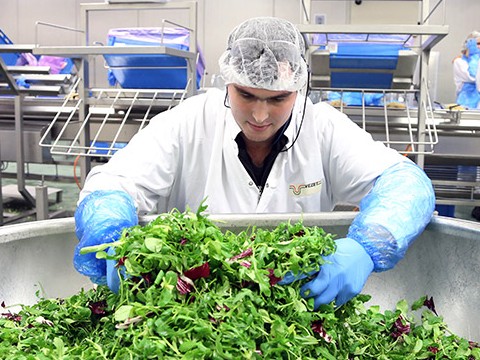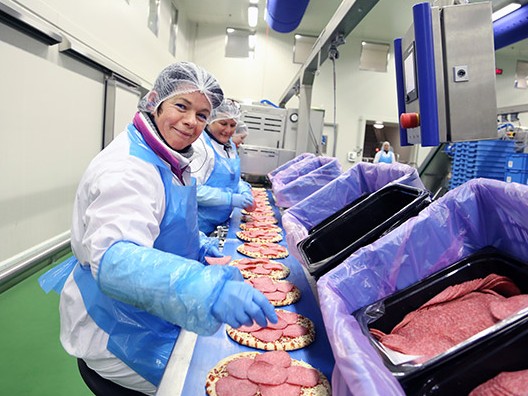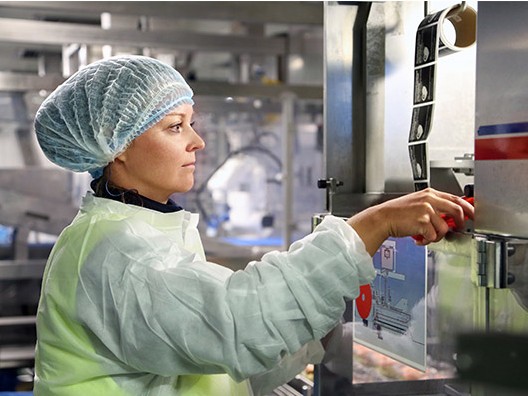
The food industry is facing a shortage of technologists, and well-qualified operators are in high demand. It is important to provide training: if you fail to do so, you risk losing out to your competitors. Read on to learn about recruiting, motivating and developing employees.
Decisive workers with the right training are essential for short-term and long-term success in the food industry. For many companies, employee training is an indispensable part of being a ‘good employer’. One of the participants on the company visit summed it up perfectly: “Take good care of your employees, and they will take good care of your company. Training is part of that. It’s essential.”
What are the challenges relating to staff development, and what are the trends and developments? That was the focus of the OSV’s company visit to the ROVC TechAcademy Food. During a presentation, Maartje Mikx, Business Developer at ROVC, highlighted findings from their recently published Good Practice Report on ‘Decisive employees in the food sector’. This is based on research conducted by ROVC in the summer of 2013 among 21 medium-sized to large food companies in The Netherlands. The report provides a frank and revealing insight into the respondents’ organisations.
‘Regard training as an investment which is subject to the same business rules and considerations as any other investment’
While there are many similarities between equipment operators and maintenance employees at food companies and those at manufacturers in other sectors, there are also some differences, such as the necessity for food-related knowledge and skills about processes such as mixing, separating, heating and cooling. Because food industry operators work with recipes and formulations, handle natural products and must adhere to strict rules regarding cleaning and disinfecting, they need specific food knowledge.
Maartje Mikx: “We see that most food manufacturers consider it important that their maintenance staff have basic knowledge about hygienic maintenance, formulation and HACCP. Many maintenance staff in the food sector already have that knowledge, but for those who are new to the industry short training modules about those topics can help to get them up to speed more quickly. That also contributes to improved communication between the Maintenance and Production departments.”

One important development within the food industry is the introduction of autonomous maintenance. 75% of the respondents indicate that food equipment operators have technical tasks or that they are moving towards having them. Improving acceptance of that development among the maintenance employees and involving the operators in their work remains one of the challenges on the factory floor. How can that be tackled? Maartje: “Without training, supervision and clear agreements, it’s not wise to let operators perform first-line maintenance work and/or solve technical problems themselves. However, it is possible to gradually teach the operators how to do specific tasks. They don’t need to have obtained a fully fledged technical qualification in that case.”
In many companies, after receiving technical training an operator will handle tasks previously performed by the engineer. That doesn’t always go down well; engineers can interpret that as duties being ‘taken off them’. “It’s important to take this into account,” advises Maartje. “Keep the communication open, such as by involving the engineer in training the technical operators. That will help him to accept the new division of duties step by step. Also, tell the engineer which other activities he will be given to replace the transferred duties. The engineer can be asked to help out with various aspects of training for the technical operators, such as by working with the manager to decide on which (maintenance) duties should be carried out by the technical operator. Other ways are by giving the engineer a say in the design of the training programme, or by advising and answering questions from the lecturer/trainer. The engineer can also accompany the trainer during an in-company training session to answer operators’ questions. Needless to say, he will have to help the operators with their new tasks in practice and give them the chance to perform the new activities themselves. He can also be involved in evaluation and assessment of whether the technical operators are competent in their new role.”
Tips from the Good Practice Report
Implementing autonomous maintenance:
What kind of people is the food industry actually looking for? Maartje: “We see that technical vacancies are difficult to fill, especially in the meat processing sector. But there is also a shortage of maintenance staff, heads of maintenance and product technologists (food technologists). We sometimes hear that there are enough operators available and that it is possible to train them, but that it can be difficult to recruit employees with the right mindset. As the economy picks up, attracting new technical staff is expected to become an even bigger challenge. By the way, approximately 30% of the respondents in our study are not recruiting at the moment because they actually have to downsize in terms of full-time employees in the coming months.”
‘Training helps to improve communication between the Maintenance and Production departments’
Recruitment tips
It can sometimes be difficult to find sufficient participants to fill a class. Group training might not be possible due to lots of dual roles, a flat hierarchy or small production teams. Time can be another factor. A quote from the Good Practice Report: “Time is always a challenge. Production shifts and varying work times always make it difficult to free up employees for training, and to combine departments within a learning group. The 50-plus apprenticeship students have made such a mark on the current timetables that few other opportunities remain for other group-based training activities.” How can that be solved? Maartje: “One possible solution can be the ‘vocational school’ – a school for a number of companies within a particular region or sector which offers training that is aligned with the participating companies’ learning needs. The advantages include shared responsibility for filling group training courses and efficient and effective employee development. This is an affordable set-up which helps companies to save recruitment costs by working together to attract new employees. We are pleased to help with the establishment of a vocational school with companies in your region or sector.”
At several companies, it is notable that the vocational training does not have recognised vocational-level status even though it displays a number of the relevant characteristics. One respondent: “The training course covers QHSE, company rules, HACCP and a process section. It has the characteristics of a vocational apprenticeship, but no official status. The e-learning programme provides the theoretical background. They then gain 6 weeks of practical experience. The programme concludes with a test of competence. If the employee completes everything successfully, they can work on the line independently.”
Within a number of companies, completion of vocational training is linked to the salary scale. Other companies purposefully opt for an official vocational qualification so that the employee obtains a recognised certificate, which in turn adds value in the eyes of customers and suppliers. Sometimes standard books are used during the training course but the content of the lessons is tailored to the individual company. For example, companies decide which equipment to focus on in the lessons based on what is used in the factory. The more general subject matter is supplemented by illustrations based on the company’s own machinery.

Almost all companies view training as a cost. However, Maartje prefers to regard training as an investment which is subject to the same business rules and considerations as any other investment. Is ROI purely a matter of spend? Or also of results in other areas? Maartje: “If you can, express the training result in financial terms. However, that’s sometimes impossible. In that case, we recommend gaining a qualitative overview of the return. In our book called ‘Rendement van opleiden in de techniek’ (in Dutch only) we describe a methodology for this using an example of a manufacturer of French fries. This can also be found on our website (www.rovc.nl/rendement).”
 This company opened its doors to members of the Ondernemers Sociëteit Voedingsindustrie (OSV). Are you keen to participate in a future company visit? See the OSV website for more information.
This company opened its doors to members of the Ondernemers Sociëteit Voedingsindustrie (OSV). Are you keen to participate in a future company visit? See the OSV website for more information.
Source: ROVC